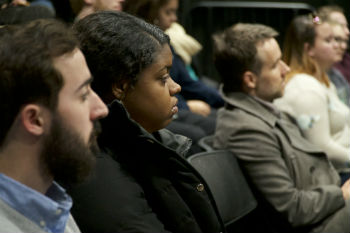
Before the performance of his one-man show at MSU’s Wharton Center for the Performing Arts, sociopolitical comedian W. Kamau Bell took the time to meet with students and to answer questions about his career, his role as an activist, and even his favorite ice cream flavor.
Bell was on campus Feb. 27 as part of the College of Arts & Letters’ Leading Voices Lecture Series and in celebration of Black History Month.

“With him being a political comedian during a time like this, it was interesting hearing about how he handles such topics,” said Imani Bonner, a senior Theatre major who attended the meet and greet held at the MSU Auditorium prior to the Wharton Center performance. “It also was good to hear his perspective as a performer, especially since I am a Theatre major who wants to go into entertaining and acting. It helps to hear first-hand how professionals find a process and figure out what works and what doesn’t work. Learning more about your journey as an artist is always good, and hearing from someone who is at where you aim to be as an entertainer is always beneficial.”
“My goal for the show is that people walk out having different conversations than the one they were having when they walked in.”
In addition to his work on the Emmy Award-nominated CNN series, United Shades of America,and his podcasts, Denzel Washington is The Greatest Actor of All Time Period and Kamau Right Now!, Bell travels the country to perform his stand up show, The W. Kamau Bell Curve: Ending Racism in About An Hour, which is the show he performed at the Wharton Center’s Pasant Theatre on Feb. 27.
In 2007, Bell wrote the first version of this one-man show, which comments on race and racism in America, but the content of the act changes with current events. The Feb. 27 performance touched on the Oscar’s, which were broadcast the day before the Wharton Center appearance.

In a world that finds many different ways to discuss racial issues, Bell said he finds that comedy is often the best route.
“If people are laughing, it means they’re paying attention,” he said. “You can talk to and lecture somebody and you don’t know if they’re thinking about their grocery list or what they’re going to watch on Netflix later, but if they’re laughing, you know they’re engaged in the conversation and listening.”
After Bell’s evening performance at the Pasant Theatre, he took questions from the audience, which ranged from Denzel Washington movie recommendations to how to speak to children about racial issues. These questions were only the beginning of the conversations Bell hoped to spur with his performance.
“My goal for the show is that people walk out having different conversations than the one they were having when they walked in,” Bell said. “They could be saying ‘I hated that guy. I don’t agree with anything he said!’ but at least they’re having a conversation.”
While he was on campus, WKAR interviewed Bell. To listen to that interview, visit the WKAR website.
Written by Alexandria Drzazgowski, Professional Writing Major


